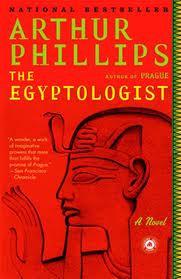Phillips, Arthur (2004). The Egyptologist. New York: Random.
The epistolary novel is a difficult form, because written language uses a different diction from conversation, and is inherently less alive than real-time dialog and narration. Since a novel is already a written document, an epistolary novel that presents characters’ journals and letters is doubly dead, in the sense that it is a document about documents. But maybe that is a good format for a story of long-buried Egyptian kings.
Phillips presents the journals, letters, maps, drawings, and other papers of a 1920’s British explorer in Egypt, an ex-Harvard academic who hopes to discover vast treasure by finding the tomb of a little-known thirteenth dynasty king called Atum-hadu. Few other academics believe such a king existed, but Trilipush, the explorer, manages to raise funds from a Boston businessman to finance the expedition. He is also engaged to marry the businessman’s daughter, despite her chronic “sickness,” which we eventually discover is a heroin addiction.
A second, parallel story, is told through the long, rambling letters of a retired Australian detective, Ferrell, written in 1957. He tells of his decades-earlier investigation of a missing Australian orphan which brought him into contact with Trilipush, his rivals, and fiancé. He reports that he uncovered at least two, possibly four murders in that context.
Neither story is very interesting in itself, because the epistolary form puts so much emotional distance between the readers and the characters, and renders the narration into the kind of telegraphic diction and limited information that documents have. But the parallel to discerning the meanings of obscure hieroglyphics on ancient tombs is obvious. However, Phillips skillfully lets the reader discover that both Trilipush and Ferrell are self-deceived, unreliable narrators and that’s where the fun comes in.
Trilipush’s pompous, self-serving comments eventually make us doubt his academic competence, character, and even identity. One of the best passages is a series of translations of the Atum-hadu’s so-called erotic poetry. Other scholars, who Trilipush derides, translate a sequence thus:
A beauty’s gaze and touch
Can rain down joy or sorrow
In equal measure
But “Pushy” is convinced those hieroglyphs should be translated as:
Atum-badu’s sweet lover
Strokes the royal member first with her eyes
Then with her claws, until they tear
And make bleed the rigid scepter of his power; and he sighs
The discrepancy is subtly hilarious, and reveals the extent of Trilipush’s narrow-minded obsession with a king who wrote “erotic” verse, because that’s a better story for fund-raising purposes.
Similarly, it becomes apparent from his letters that detective Ferrell thinks he is Sherlock Holmes and has his own wild ideas about all the characters involved. The two narrators are distinct in voice and personality, and we can wonder if the ancient pharaohs were as petty beneath their grand hieroglyphics as our story characters are beneath their papers.
I found the book slow going, in part because the epistolary format is as dry as Egyptian sands. There is so little dramatic tension that I did not care enough. But I did admire Phillips’ skill. The characters are well-imagined and there is a pretty good sense of time and place for each story, and the story beneath the story is brilliant. The flaw is that once we realize both narrators are self-serving baboons, we’re not interested in their documents any further. That dynamic undercuts the project. Still, it gets high points for creativity.

